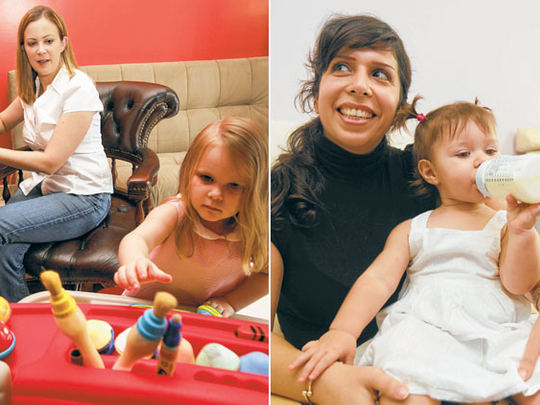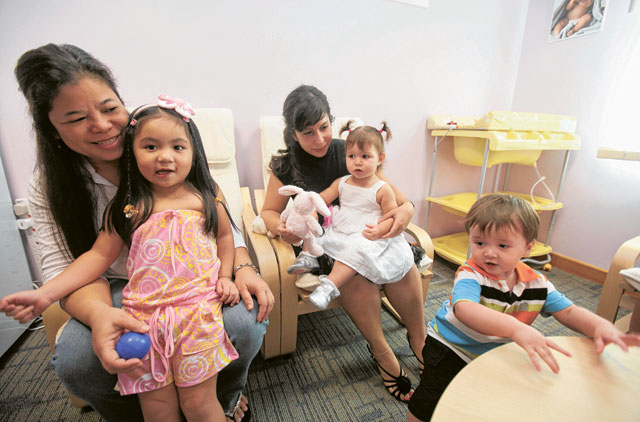
Dubai: Recruiters are finding that for more and more women professionals in the UAE, money is not their first consideration when job hunting.
In a region where staff turnover is high and people tend to pursue higher salaries, women are seeking workplaces that allow them flexible hours, longer maternity leave and part-time options among other considerations.
This allows them to maintain the all important work-life balance and job satisfaction while companies benefit from lower staff turnover, more loyal staff and higher productivity, experts say.
Job hunting priorities
In January this year Michael Burchell, author and Partner and Director of the Great Place to work Institute, UAE, launched a study announcing the top ten companies to work for in the UAE. The survey looked at a range of companies from Microsoft to bayt.com to Zayed University, and multinational companies to local ones.
"Women today are looking for more flexibility and more focus on connecting careers and family and they are not willing to settle for one or the other," said Burchell. The best organisations do a good job of integrating the family into the organisation he said.
Middle East job site bayt.com also conducted a study, named Women in the Middle East Workplace 2011, and found that the top benefits offered include maternity leave, family health insurance, training, extended unpaid leave with job guarantee, educational allowance for children and segregated working areas for men and women.
Maternity leave was the top benefit followed by family health insurance and training, said chief marketing officer Lama Ataya.
"For women it's working hours — and if we implement flexi hours — that's most important when we interview them, and then the salary," said Muneera Hussain Al Hammadi, a senior human relations officer at the Dubai Airport Free Zone.
DAFZ human capital manager Sultan Ghulam Hussain explained that women who interview at the federal organisation prioritise work timings and location. "For example, if someone is working in a nearby office and they got a better offer further away, they won't consider it. It's more comfortable to work closer to their home."
In January last year, the DAFZ transformed its workplace policies to implement new ones that were in line with international practices but also tailored them to the UAE, said Al Hammadi. "We benchmarked ourselves with other government organisations that are also implementing new measures."
Raymi Van Der Spek, executive director for strategic development at the University of Wollongong in Dubai, said favourable workplace policies ranked highly among women and it was not just about money.
He said: "In this country salary still has a big initial influence, you can't take that away, but I think people are gradually starting to recognise other factors."
Van Der Spek said many organisations still operated with a stopwatch mentality, which is necessary for certain businesses but not all. "We are more concerned about outcomes than watching how it happens," he said.
UOWD human resources manager Susan Wei said: "For females, benefits are more important for them especially if they have young children — it's the work-life balance that's important and our turnover rate is very low."
"The UAE is a very family-orientated culture and no one will look at you funny if you have to take care of a child because it's family. Family isn't a dirty word here — it's expected and encouraged," says Erin Miller Rankin, a senior associate of the International Arbitration Group at the Dubai branch of the Freshfields Bruckhaus Deringerlaw firm. She also runs a runs a quarterly discussion seminar called MENA Women in Business and is familiar with the hurdles professional women face.
Progressive policies
After revising its policies, and taking into account feedback in staff surveys, Al Hammadi said the DAFZ implemented 60 calendar days of maternity leave as compared to the 45 days stipulated by UAE labour law, a daily feeding hour for six months after returning from maternity leave, "escort leave" so that a mother can stay with a child if admitted to hospital, team building activities for women staff, flexible working hours and an education allowance for daycare costs.
As a high powered lawyer and mother to a toddler, Rankin said her company encourages an individualised working plan whether she is caring for a parent, an illness or a child. "You can approach your line manager to explain the situation and see what can be done so that you can meet your work commitments and other priorities."
Rankin has a home office which she works from every so often. She also has had to be flexible if meetings are scheduled in the evenings and with the travel that is required of her.
Lena Al Suhaili, human resources manager at Nokia Corporation Middle East and Africa, said the organisation decided last year to set a female-friendly standard across all offices in the region.
To this end maternity leave with full pay was increased to three months and unpaid to six months.
Flexible hours are also encouraged and a hot-desk policy is in place where staff can work from home or in the office. "For our female employees that means a more comfortable and manageable work-life balance that they are fully in control of," Al Suhaili said.
"We have also added paternity leave and matrimonial leave to our HR policy, where each special occasion warrants three days off with full pay."
UOWD has flexible hours, part time work options, longer maternity leave (two-and-a-half months with full pay and another two-and-a-half without pay), feeding hour after maternity leave for 18 months, paternity leave and a nursing room on the university premises. The work week, 37.5 hours, is also shorter than the minimum requirement stipulated by UAE law.
Wei said a competitive medical insurance package that included maternity leave, and costs Dh2,000 more than insurance for men, was very attractive to women employees.
Burchell said companies like Microsoft encouraged staff to bring family to company functions and in other parts of the world, spouses are involved in training development opportunities.
"If I was a company doing business in UAE I would think about how I would create opportunities and not just assume that an employee is there from 9 to 5 but that they have a whole life. We should acknowledge the talent that they have and bring the whole person into the job."
Organisations that are willing to do that will save money in the long run as it will prevent brain drain and create better employees.
Bayt.com is in the Great Place to Work top ten list and what makes it stand out is its respect for women's family commitments, said Ataya. The company allows part-time, flexi-time, extended leave, telecommuting and consultancy work arrangements and bayt.com working mothers are encouraged to bring their children to work on special occasions.
Workplace practices
When asked if the UAE is on par with international workplace practices and female staff's needs, Burchell said the top companies are doing good things. "The UAE has a fair distance to cover not because of a lack of desire but maybe because they don't know how or what's the benefit."
Companies across the region are definitely taking interest in international HR trends and are moving away from a strict work schedule of "clocking in" to one where the results and a comfortable work culture are what matters the most, said Al Suhaili. Staff are also equipped with laptops and smart phones so that they can conduct their business at any location.
A number of branch offices in the UAE reflect the head office's goals said Rankin. "Freshfields has goals in terms of the diversification of its workforce and encouraging women to succeed whether they are in Germany, London, Brussels or Dubai."
Van Der Spek said UOWD has made a conscious decision to link the workplace practices and Australian heritage to the Dubai-based campus and the overall workplace attitude.
"We're all aware of the standard workplace practices that occur here and we've made a conscious decision to stand out from that."
Women-friendly work policies
- Flexible working hours where staff can choose their hours with approval from a line manager
- Part time work options available
- Longer maternity leave beyond the 45 calendar days stipulated by UAE labour law
- For 18 months following the delivery, female staff who are nursing can take two breaks in addition to any prescribed rest period, as stated by UAE labour law
- Paternity leave where male staff members can also take on the responsibility of caring for a newborn
- Nursing rooms on the organisation’s premises
- Additional paid leave for parents who have sick children in hospital








